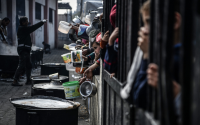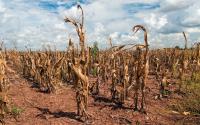4 September 2005Znet
The following was a ZNet Sustaiiner Forum Post replying to a question about the aftermath of bombing Afghanistan. It also appeared in the ZNet Blog, where a subset of Chomsky's forum posts are placed. For all the forum posts, become a sustainer. For the blog content, visit it from the ZNet top page.
I plead guilty of failing to write anything at all about this at the time when it mattered, or even to mention it except in some scattered interviews and a few remarks in talks. That failure was deplorable, since the threat of bombing, and then the bombing, were among the most disgraceful acts of modern history, as was known instantly. In these few scattered remarks, I quoted the international relief agencies, which bitterly denounced the threat of bombing, then the implementation of the threat. As they warned, the threat of bombing, which forced them to leave the country, and then the bombing itself, put huge numbers of people at risk of starvation.
…That starvation could cause death of millions was the clear, explicit, unmistakable message of just about every international aid agency and those who cared about the people of Afghanistan. That was the message they were desperately seeking to convey. I did report their message in a few talks and interviews, but far too little…
As to the facts, the basic story is this. On Sept. 16, five days after 9-11, the NY Times reported that Washington delivered to Pakistan a series of demands. Among then, Washington "demanded...the elimination of truck convoys that provide much of the food and other supplies to Afghanistan's civilian population." It is worth reading and re-reading that statement. It would have been extraordinary if, say, 1000 people in Afghanistan's civilian population were relying on the convoys that the US ordered be eliminated. But it wasn't 1000. The numbers were estimated by the agencies at about 5 million. Simply think for a moment about what those orders meant. The fact that there wasn't an enormous outcry of protest is utterly scandalous.
The aid agencies did protest vigorously. You don't have to go to exotic sources to discover that. By late September, after the threat of bombing but before it began, the UN Food and Agricultural Agency estimated that 7 million Afghans might face starvation if bombing were initiated. At the same time, you could read in the NY Times that "The country was on a lifeline, and we just cut the line," quoting aid workers who were evacuated under the threat of bombing, as virtually all were. Just to cite a few of a flood of other examples, a director of the UN World Food Program said that after the bombing began, the threat of humanitarian catastrophe, which was already very severe, had "increased on a scale of magnitude I don't even want to think about."
A spokesperson for the UNHCR said that "We are facing a humanitarian crisis of epic proportions in Afghanistan with 7.5 million short of food and at risk of starvation." After two weeks of bombing, the NYT reported that the number of Afghans in need of food had risen from 5 million to 7.5 million -- and the lifeline was cut. After a month of bombing, Harvard's leading specialist on Afghanistan wrote in the prestigious journal International Security that "millions of Afghans [are] at grave risk of starvation" (winter issue). And so it continues.
…Returning to the events of September-October 2001, to put such a mass of people at risk of "silent genocide" -- to borrow the term used by UN agencies for far lesser threats -- is a crime of the highest order, and failure to condemn it vociferously and to organize to stop it is a bitter condemnation of the US and its allies. To repeat, I unhappily accept my share of the blame for barely mentioning it when the evidence was so overwhelming and the actions of such extreme criminality.
Considerably later, I did write about it, though still far too little, also citing the shocking reports from the most respectable mainstream sources months later of mass starvation and other horrors, and quoting the pleas of some of the most prominent anti-Taliban Afghan individuals and organizations to stop the bombing, which was destroying the country. But that was far too late, for which, again, I plead guilty.
All of this would have been horrendous enough even if there had been a credible reason for driving the aid agencies out of the country, demanding termination of the flow of food, and then the bombing with its shocking expected effects. But there was no credible reason.
After several weeks of bombing, the US and UK concocted the claim that they were bombing to rid the country of the Taliban. One may decide for oneself how to react to placing 7.5 million people at "grave risk of starvation" to implement that goal, but it is irrelevant, because that was not the goal. The bombing was undertaken to compel the Taliban to turn over to the US people the US suspected of involvement in 9-11, but without presenting the evidence that the Taliban requested -- because Washington had no evidence. The head of the FBI conceded in Senate testimony 8 months later that after the most intensive international investigation in history, the FBI could only report that it "believed" the plot might have been hatched in Afghanistan but that it was implemented in Europe and the UAE, all US allies.
These are, again, crimes of extraordinary magnitude, as is the failure to protest them vigorously and to act to terminate them.
…In the few comments I made about this horrifying atrocity at the time, I mentioned that we would never know the consequences, because they would not be investigated. The reasons for believing that were quite strong: the powerful don't investigate their own crimes. Take Vietnam. We do not know, literally within millions, how many Indochinese died in the US wars, and polls show that what the population believes is vastly below even the official figures. Same with innumerable other cases. And the same held true in this case.
Though as noted, I did cite in print later the reports I could find from mainstream sources, they were few and scattered. Such topics are simply not investigated, unlike the crimes of official enemies, where huge investigations are undertaken to unearth any scrap of evidence that might give some idea of the scale of their crimes.
But more important, the answer to that question has no bearing whatsoever, precisely none, on assessment of the pre-bombing orders to Pakistan, the threats that drove the aid agencies out of the country, or the bombing itself. It's the merest moral truism that actions are evaluated in terms of the range of anticipated consequences. We understand the truism very well with regard to official enemies.
Take, say, Khrushchev's sending missiles to Cuba in 1962, acts that carried a significant risk of nuclear war. Sane people regard that as an act of criminal lunacy, whatever the motives. I do not know whether there were Communist party hacks who were so utterly depraved that they "indict" those who warned of the threats on the grounds that there was no nuclear war. I don't know of any, but perhaps there were some...
These observations are really elementary. It is a remarkable comment on the moral and intellectual culture in which we live that so many fail to comprehend them -- with regard to ourselves, that is; with regard to enemies everyone rightly takes them for granted.
http://www.zmag.org/content/showarticle.cfm?SectionID=49&ItemID=8660






